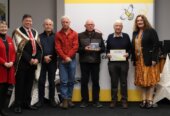
Commercial eel fisherman and Eel Enhancement Company chairman Mike Holmes says a decision to cut longfin eel quotas could have serious ramifications for the industry, noting that local eel numbers remain healthy.
The new eel fishing year kicked off on October 1, with catch limit changes coming into effect following a public consultation in July.
The review of North Island eel sustainability by Fisheries New Zealand asked the public to have their say on whether the catch limit for longfin eels should be reduced by 15 per cent, and by 32 per cent for commercial fishermen, in catchment areas around the country including locally.
Cambridge local Mike Holmes, Chairman of the Eel Enhancement Company (EEC) and a commercial eel fisherman, made a submission at the time – as did several other fishermen in the industry – to stick with the status quo. “We don’t have a stock problem, which would normally be why you would reduce the limit… we’re the first to ask for quota cuts if we need them,” he said at the time.
After the public consultation wrapped up, Fisheries New Zealand announced recently that they would indeed follow through with the proposed quota cut.
“That’s quite disappointing, not really surprising, but disappointing,” Mike said following the announcement.
A spokesperson for Fisheries New Zealand said a large proportion of the submissions relating to eels wanted a reduction or complete closure of the longfin eel fishery. “Responses to submissions are just one of a number of factors that get considered when making decisions about fish stock management,” Jennifer Hape explained. “The most recent stock assessment showed that although all North Island longfin eel stocks were (with 60 per cent probability) at or above the level they need to be to ensure their sustainability, the stocks were not showing clear signs of increasing abundance. To make sure the stocks become more abundant in the future, the decision was made to cut commercial catch limits.”
Mike Holmes, who runs the eel transfer at Karapiro dam – allowing eels spawned at sea to return up the river – confirmed that juvenile eel recruitment is better than ever, continuing its gradual increase in numbers.
“It’s solving a problem that doesn’t exist… I’d say it’s more of a political decision than a scientific one,” Mike said. “We already had a big imbalance of what we could take, but now it’s even worse.”
In many cases, shortfin and longfin eels share the same habitat. When fishermen bring in their nets, (which have escape shoots for the smaller eels) they sort through the eels to comply with the right quota for longfin eels. Now with the quota cut further, it means more time spent sorting the eels.
“There’s nothing to gain, it just adds more work for the fishermen, there’s nothing in it for us… we’ve just got to do more sorting now,” Mike explained. “It’s increasing our workload and knocking our profitability.”
Mike expects the industry will now face a shortage of eels, raising meat prices and supply, and deterring the next generation of fishermen from entering the industry.
“Fishing at the end of the day is about providing food. If New Zealanders want to eat eels, bad luck guys.
“We’re thinking, what now, and what next? This is going to be an interesting year.”









